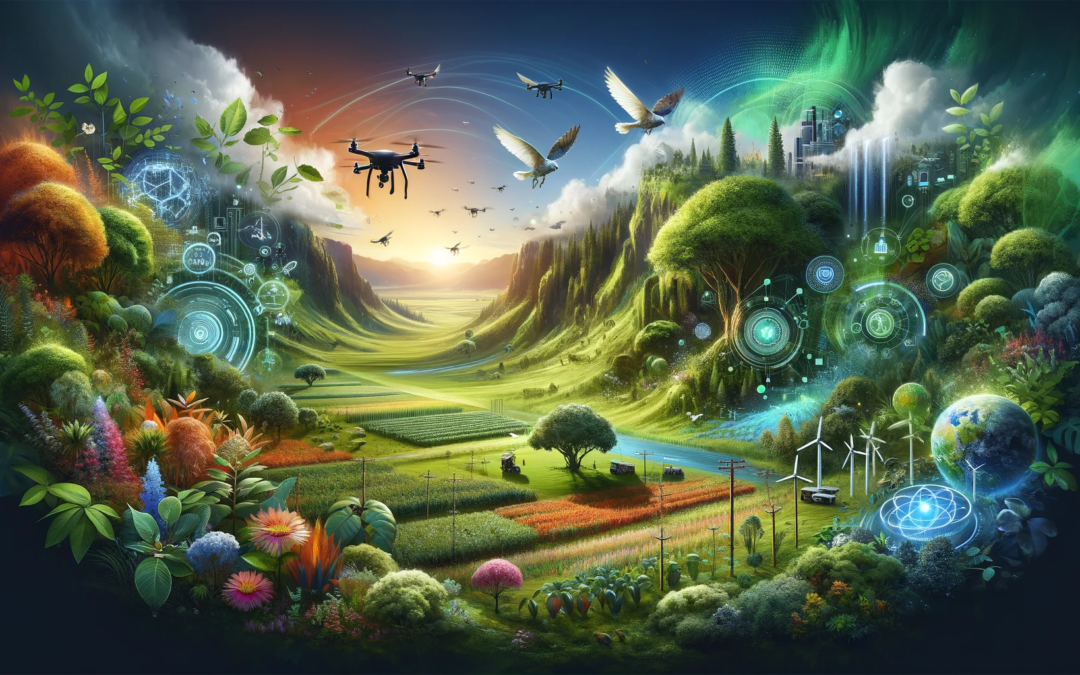As our planet faces increasing environmental challenges, the need for sustainable practices and conservation efforts has become more crucial than ever. In this blog post, we will explore the exciting and transformative role of AI in environmental conservation and sustainability. With its ability to analyze vast amounts of data and make intelligent decisions, AI is proving to be a valuable tool in preserving our ecosystems and developing sustainable practices across various industries.
AI in Ecosystem Monitoring and Preservation
AI technologies are revolutionizing the way we monitor and preserve ecosystems. From tracking wildlife populations to predicting environmental changes, AI-driven projects have made significant contributions to conservation efforts. For example, AI-powered drones equipped with cameras and sensors can survey large areas, helping researchers gather data on endangered species and their habitats. This data enables scientists to make informed decisions about conservation strategies and the allocation of resources.
AI in Sustainable Resource Management
Efficient resource management is a key aspect of sustainability, and AI is playing a crucial role in optimizing resource usage. AI algorithms can analyze data on water consumption, energy usage, and waste production to identify areas where improvements can be made. By optimizing water usage, enhancing renewable energy sources, and reducing waste, AI is helping industries become more sustainable and environmentally friendly.
AI in Pollution Control and Climate Change
Pollution control and climate change mitigation are pressing global concerns, and AI tools are proving to be invaluable in these areas. AI-powered sensors can monitor air quality, alerting authorities to potential pollution hotspots and enabling them to take prompt action. AI algorithms can also analyze data on waste management, identifying patterns and trends that can help reduce pollution. Furthermore, AI is driving the development of clean technologies, such as advanced energy storage systems and efficient transportation, which contribute to the reduction of carbon emissions.
AI in Sustainable Agriculture and Food Production
The agricultural sector is undergoing a transformation thanks to AI. Precision farming techniques, enabled by AI, allow farmers to monitor crop health, optimize irrigation, and improve yields. AI algorithms can analyze soil data, weather patterns, and crop characteristics to provide farmers with real-time recommendations, reducing the need for chemical inputs and minimizing environmental impact. AI-driven initiatives are also promoting sustainable agricultural practices, such as vertical farming and aquaponics, which use resources more efficiently and reduce the carbon footprint of food production.
Challenges and Ethical Considerations
While the potential of AI in environmental conservation is vast, it is important to address the challenges and ethical considerations associated with its use. Ensuring data accuracy and reliability is crucial, as decisions based on flawed or biased data can have detrimental effects. Long-term impacts and unintended consequences of AI deployment should also be carefully evaluated to prevent any harm to natural environments. Responsible AI deployment, with transparency and accountability, is essential to ensure that AI-driven sustainability solutions align with ecological responsibility.
The Future of AI in Environmental Conservation
The future of AI in environmental conservation is promising. As technology continues to advance, AI will play an even more significant role in shaping sustainable practices. With ongoing research and development, AI has the potential to revolutionize conservation efforts and contribute to a more sustainable future. However, we must also consider the long-term implications of relying heavily on AI and ensure that we strike a balance between technological innovation and ecological responsibility.
Engaging with the Audience
We would love to hear from you! Share your thoughts and experiences with AI in environmental conservation and sustainability. What do you see as the potential benefits and challenges of AI-driven solutions? Join the discussion and let’s explore the future of our planet in the era of advanced AI.
Conclusion
AI is proving to be a game-changer in environmental conservation and sustainability. From monitoring ecosystems to managing resources efficiently, AI is helping us make significant strides towards a more sustainable future. By embracing AI innovation while upholding ecological responsibility, we can harness the power of “green intelligence” to protect our planet for generations to come.
Visual Elements:
– Include images or graphics showcasing AI applications in environmental conservation, such as ecosystem monitoring tools, sustainable resource management systems, and pollution control technologies.
– Use infographics to illustrate the impact of AI on enhancing sustainability and conservation efforts.
SEO Elements:
Keywords: AI in environmental conservation, AI in sustainability, AI-driven conservation technology
Meta Description: Discover how AI is transforming environmental conservation and sustainability efforts, from ecosystem monitoring to pollution control. Explore the potential benefits and challenges of AI-driven solutions in creating a more sustainable future.










